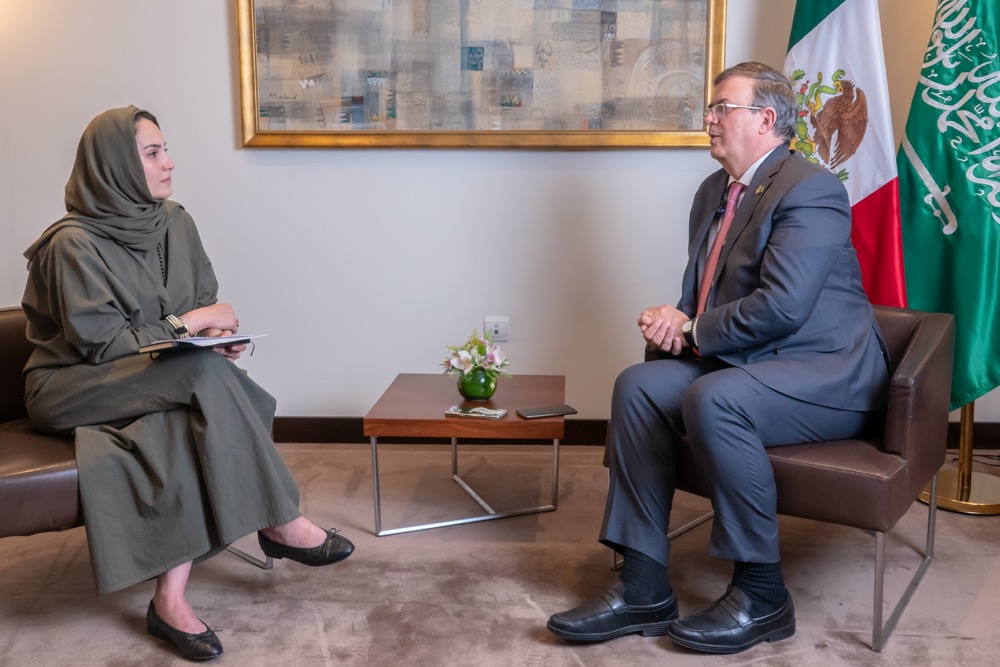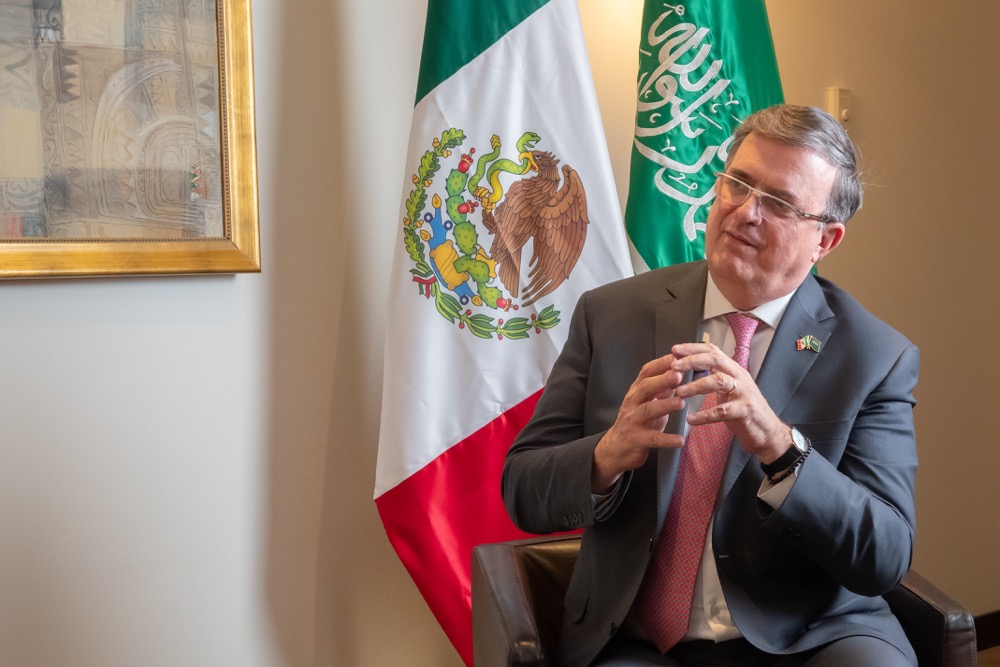RIYADH: Mexico opposes any kind of violence against a sovereign country, be it the invasion of Ukraine or missile attacks targeting Saudi Arabia, the country’s top diplomat has said.
Marcelo Ebrard, Mexico’s foreign affairs secretary, made the point forcefully during an exclusive interview with Arab News in Riyadh after arriving on Wednesday on the first stop of a four-country tour that will also take him to Qatar, the UAE and India.
The visit comes as Saudi Arabia and Mexico prepare to mark the 70th anniversary of the establishment of diplomatic relations. Both countries are major energy producers, but there is a lot more to the relationship than just hydrocarbons. Both are diversifying their economies, investing in the knowledge economy and developing agendas for climate action.
At the outset of the interview, Ebrard made Mexico’s position on the Russia-Ukraine conflict clear. “We condemn the invasion, because this is an invasion by one country of another,” he said.
“Mexico suffered, as you probably know, four invasions during its history. So, we understand clearly what we are talking about when one country invades another. We condemn this (way) of solving political differences.”
However, in the context of the Russian invasion, Ebrard cast doubt on the effectiveness of economic sanctions as a panacea.
“We have a very strong position against sanctions, because usually it doesn’t work, as in the case of Cuba,” he said, referring to the US trade embargo, believed to the longest sanctions regime in modern history.

Noor Nugali, Arab News Assistant Editor in Chief, with Marcelo Ebrard, Mexico’s foreign affairs secretary. (AN photo/Huda Bashatah)
“They have maintained a blockade for 60 years now. It doesn’t work. Only the people suffer. As far as Mexican foreign policy is concerned, we are against sanctions. Not only in this (Cuban) case, but always.”
Commenting on the discussions this week between Prince Faisal bin Farhan, Saudi Arabia’s foreign minister, and his Russian counterpart Sergei Lavrov, on the situation in Ukraine, as well as diplomatic efforts to end the crisis, Ebrard said that any mediation attempt is worth trying.
After calls with the leaders of Ukraine and Russia on March 3, Crown Prince Mohammed bin Salman had said Saudi Arabia was ready to exert all efforts to mediate between the warring parties.
“If Saudi Arabia can reach some kind of agreement, we are going to be very happy to hear about that,” Ebrard said. “The political solution is the only one, because the other (solution), violence, is only going to create huge suffering for society.”
At a time of global energy shortages and soaring geopolitical tensions, Saudi oil facilities, as well as population centers, are being targeted by Yemen’s Houthi militia. How does Mexico view the situation?
“We are against any use of violence as I mentioned. It is the same case with these kinds of attacks on Saudi Arabia,” he said.
“So, we need to support Saudi Arabia and its case for respect for its integrity and the (security of) its people. We condemn such kinds of violence against this country.”
As for Houthi terror attacks on civilian areas, he reiterated the Mexican government’s condemnation. “We did it in the past and are doing it right now. We are against those kinds of attacks and that kind of violence, any kind of political violence.”
Elaborating on the issue, Ebrard said: “In our constitution, (we support peaceful) resolution of conflicts. We support the UN and we are against violence. We learned from our history that violence is a bad idea.
“We suffered four invasions from France, the US and Spain before. So, we learned that it’s the worst thing to do.”
Moving on to Saudi-Mexico bilateral relations, Ebrard said he foresees a bright future. “Bilateral relations will be at a higher level. We are not superpowers, but we are part of G20, who are the biggest economies of the world,” he said.
“So, we can really work together in order to improve the world and to improve our relations for the benefit of our peoples. We have 70 years without differences, which is quite unique. It is quite a good relationship right now.”
Ebrard said as the Saudi-Mexico economic relationship, anchored in trade and investments, becomes deeper and stronger, there will be practical benefits.
“Increase of tourism and development in Mexico and Saudi Arabia (benefits) both together. Increase in investment, means more opportunity for the people,” he said.
Ebrard said the Kingdom and Mexico have similar policy priorities, especially in the field of knowledge. “We have similarities. (We both want to) increase tourism and accelerate development.
“So, we have similar priorities, we are working on the same issues. So, why not join efforts, to benefit other people, for instance, to have new vaccines or medicine, solutions or pharmaceutical ideas (become reality) in the short term? Why not? We are going to try to do it.”
Asked about his views on Saudi Arabia’s Vision 2030 reform strategy, Ebrard described it as “a very interesting and very advanced” idea.
“The reforms are very interesting. And you are advancing very fast,” he said. “This is the impression that we have from Mexico. The reforms, the new vision, are an inspiration for all countries. I recognize that this is a very important initiative.”
Ebrard said that he was impressed by a visit to King Abdulaziz City for Science and Technology in Riyadh. “They have 60 facilities. It is amazing. And I think more than 2,000 researchers,” he said. “So, they showed us several very interesting projects. We are going to follow up this conversation for joint efforts.”
He expressed satisfaction with a meeting with Saudi Arabia’s Tourism Development Fund. “They gave a presentation to representatives of the Mexican private sector, who form the business part of my delegation, on the new developments coming up in Saudi Arabia in the coming years,” he said.
“Then I had a conversation with the foreign affairs minister (Prince Faisal bin Farhan), who is a very smart and good friend of mine.”
During Prince Faisal’s visit to Mexico in November last year, the two had noted the “excellent synergies between Mexico and Saudi Arabia within the G20 and the UN for promoting initiatives that more broadly benefit developing countries.”

Marcelo Ebrard, Mexico’s foreign affairs secretary. (AN photo/Huda Bashatah)
Ebrard said: “We have similar ideas about reforestation, in Mexico and Saudi Arabia. We are promoting ideas about how to recover, in Mexico, tropical forest, and how to expand the green belt.
“This is a concrete expression of the similarities of our ideas on climate action. Then there are similarities in our positions on multilateral organizations, the search for peaceful settlement of disputes around the world, and other issues for which we are promoting solutions.
“We are together not only on the issue of climate action, but also on the transition between the energy of the present and the energy of the future. It is like flying a plane where you are going to change the engine and, at the same time, keep flying. So, few countries understand this. As Saudis and Mexicans, we understand the challenge.”
Ebrard identified tourism and infrastructure as two major fields in which the governments can work together. “We have brought representatives of the private sector as part of the Mexican delegation. We are going to receive private-sector representatives from Saudi Arabia next month,” he said.
He also listed certain sectors that he considers most attractive for investments, especially by Saudi Arabia’s sovereign wealth fund, the Public Investment Fund.
“Agriculture, fisheries, automobile industry, the new economy including e-commerce. There are several fields where our priorities converge. So why not try to increase investments and trade between us?”
Ebrard acknowledged that distance posed a challenge to growth of trade and investment, as also the absence of a direct air route between Saudi Arabia and Mexico. “You should be able to take a flight from here and arrive in Mexico City,” he said.
“This is going to be an objective for the next six months or something. It’s going to be very important.”
As a final note, Ebrard said: “We are going to follow up this conversation (we had with our Saudi counterparts) in order to see results and answers in the short term. A conversation that influences ideas and culture is the first step to change the world.”















